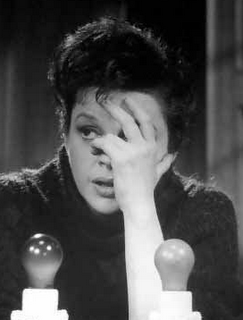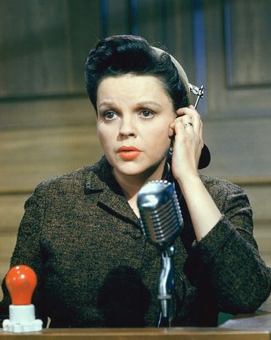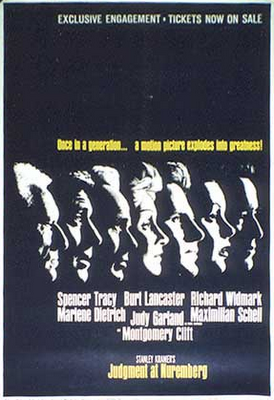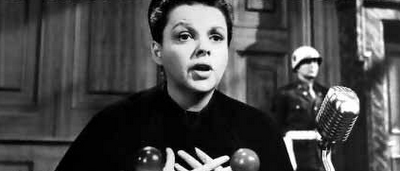 Few great actors are as adept as Spencer Tracy at putting StinkyLulu right to sleep. For reals -- comedy or drama, color or b&w, with Hepburn or without -- give the man an extended scene & Lulu just conks out. Lu should really just make a looptape of Tracy's longest scenes as a sleeping aid.
Few great actors are as adept as Spencer Tracy at putting StinkyLulu right to sleep. For reals -- comedy or drama, color or b&w, with Hepburn or without -- give the man an extended scene & Lulu just conks out. Lu should really just make a looptape of Tracy's longest scenes as a sleeping aid.So, Judgement at Nuremberg -- Stanley Kramer's 3+ hour "ripped from the headlines" courtroom epic (with Spencer Tracy as the narrative's central character) -- promised to be something of an ordeal. And? 'Twas. But for better and worse, turns out that the flick contains some truly surreal juxtapositions that periodically pinched Lulu back to consciousness. (Episodic yelling -- by opposing attorneys Maximillian Schell and Richard Widmark -- also helped.) First, the movie's just jam-packed with interesting actors. In addition to gourmet stars like Marlene Dietrich (her enigma switch turned to full power), the flick's minor characters are, almost to a one, solid supporting players who became iconic (in Lulu's imagination at least) for their 1960s-70s tv work. First, there's Captain Kirk -- all sexy and subtle (!) -- as Tracy's assistant/bailiff. With Colonel Klink (his dark side on full display) as a defendant. Plus Pa Ingalls' friend Lars Hanson as the attorney recalling a famous 1930s sex scandal. But most exciting of all: Folger's diva Mrs. Olson (Virginia Christine) as Tracy's housekeeper; she didn't offer Spencer any instant coffee complete with flavor crystals but there she was nonethe...
But -- at its core -- Judgement at Nuremberg aims to tell a painfully serious story about judges judging judges -- to wit, a war crimes tribunal assembled to assess whether Nazi-era German jurists were guilty of crimes against humanity. Set just three years after the end of the war, the film examines whether "regular" German citizens should be considered culpable for Nazi atrocities. Which sets the scene for -- alongside the 70s teevee nostalgia and soporific Spencer sidebars -- the narrative incorporation of actual documentary footage of the concentration camps at the end of WWII... 'Tis truly startling. (Really, cutting from the bulldozers at Dachau to Colonel Clink?!? Brainsprain!!!)
But very occasionally the movie becomes just a touch more than a civics lesson with cinematography. And one of those moments comes in the performance of...
Garland plays Irene Hoffman, a no longer young woman who -- as a teen -- was the non-Jewish woman at the center of a notorious "racial pollution" case targeting a Jewish man. Now married, Garland's Hoffman is reluctant but never resistant to the call for her testimony.
Unlike fellow Supporting nominee Montgomery Clift (who twitches and whines through a single, nearly unbearable scene), Garland's called on for three incrementally intense scenes. In the first, Garland's Hoffman consoles and reassures her husband even as it's clear that the request to testify has stirred ghosts. Garland plays this scene with a stunned directness that underscores her character's dread of reliving this part of her past.
 Beginning here, Garland's performance anchors the most basic message of this complicated (if not particularly complex) "message picture": even humble people are obliged to be noble, to do what's right. Garland's second scene begins to reveal the depth of her character's devastation. Her cavernous brown eyes convey how haunted Garland's Irene truly is. Garland's signature vocal quaver manifests to underscore both what's left of Irene's pride, as well as her childlike affection for the man destroyed by the earlier trial. But it's in her final scene, when Garland's Irene Hoffman becomes the target of defense attorney Schell's manic cross-examination, that Garland's particular gifts are deployed in transcendant service of the character. Judy Garland's quavering voice, her puddling eyes, that steel-girded vulnerability: Garland channels all these through Irene Hoffman as the unrelenting bully Schell tries to break her. It's one of those great moments -- when a director doesn't shy from the idiosyncratic, oft-ossified gifts of a "movie star" and is able to resculpt them into a character performance that transcends the persona. It's Judy at her jowliest, but it's Judy at her best.
Beginning here, Garland's performance anchors the most basic message of this complicated (if not particularly complex) "message picture": even humble people are obliged to be noble, to do what's right. Garland's second scene begins to reveal the depth of her character's devastation. Her cavernous brown eyes convey how haunted Garland's Irene truly is. Garland's signature vocal quaver manifests to underscore both what's left of Irene's pride, as well as her childlike affection for the man destroyed by the earlier trial. But it's in her final scene, when Garland's Irene Hoffman becomes the target of defense attorney Schell's manic cross-examination, that Garland's particular gifts are deployed in transcendant service of the character. Judy Garland's quavering voice, her puddling eyes, that steel-girded vulnerability: Garland channels all these through Irene Hoffman as the unrelenting bully Schell tries to break her. It's one of those great moments -- when a director doesn't shy from the idiosyncratic, oft-ossified gifts of a "movie star" and is able to resculpt them into a character performance that transcends the persona. It's Judy at her jowliest, but it's Judy at her best.And it was Judy at the crest one of her comebacks, certainly the comeback with the highest stakes. Flush from her legendary Carnegie Hall concert, newly (and expensively) hired for her own tv show, and here displaying the maturity of her acting chops/jowls in an Oscar-bait epic...
Judy -- "an entertainer" -- gives a junket interview from the witness stand.
Judy Garland's performance in Judgement at Nuremberg stands as the most deserved acting nomination of this film's four. (Tracy and Clift both got noms; Schell took the trophy as a token of Oscar's internationalism...) And it's a worthy testament to Garland's most mature gifts as an actress. Here, she plays a character ravaged by life who somehow maintains a poignant optimism that her efforts might matter. Garland's Irene digs deep and finds the strength to show up for the scorchingly brief glare of attention. The film, cruelly, abandons Garland's Irene on the witness stand, mid-assault, never showing her again. The glare of the spotlight vanished as suddenly as it arrived. And the impact on Garland's Irene? That becomes as collateral damage, underscoring the moral of Kramer's story: "If we didn't know, it was because we didn't want to know..." A chillingly apt tagline for this performance as well, one of two last great & ultimately devastating Garland film performances...
...
Tune in next week for the last (& most obscure) of July's Supporting Actress Sundays, featuring Una Merkel in Summer and Smoke as well as the 1961 Supporting Actress Smackdown! Looks to be a goodgoodgoody....






1 comment:
What a lovely article. I wish I had read this earlier.
Post a Comment